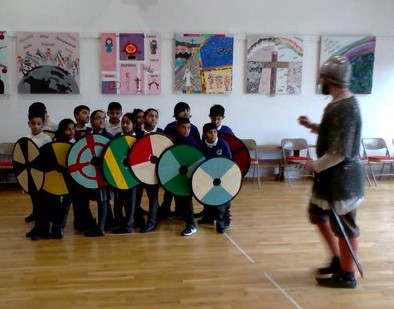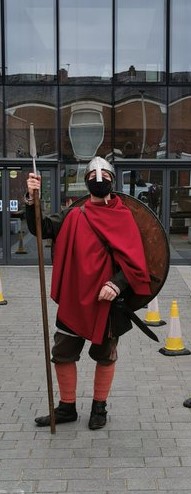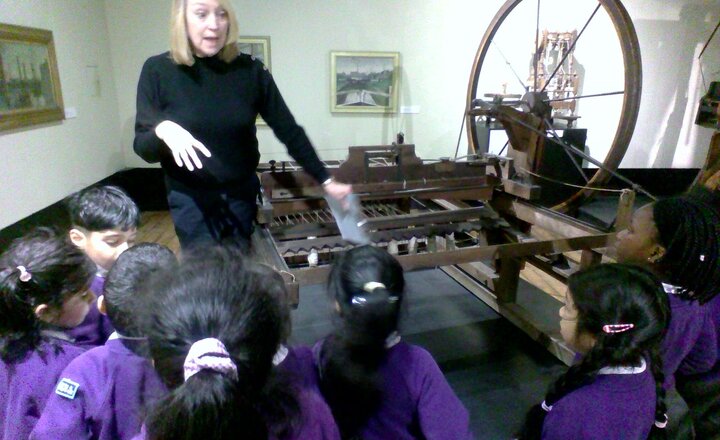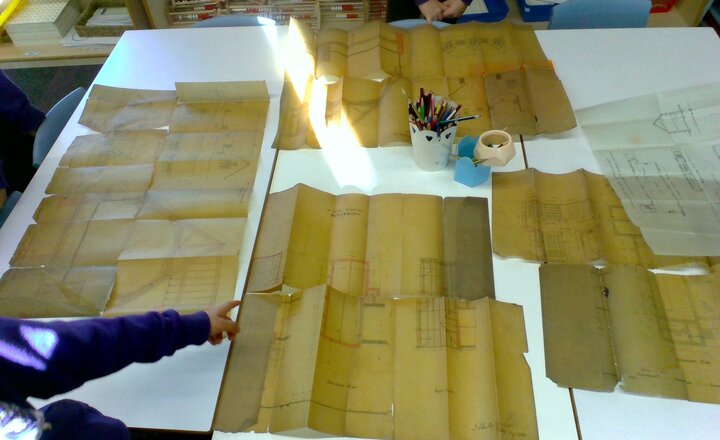
Why do we teach History?
Here at St Silas it is our aim to instil a love of History in all our children and teachers. Our aim is that, through the teaching of History, we stimulate all children’s interest and understanding about past events and the lives of people who lived in the past. We teach children a sense of chronology, in order to develop a sense of identity and a cultural understanding based on their historical heritage.
This will enable discussions about how the past events and people have impacted on our lives today. They will be curious and want to know more about the past and will be able to ask challenging questions to help them use evidence to develop their own judgements and formulate their own conclusions.

How do we teach History?
Teaching, learning and historical enquiry is planned in line with the curriculum overview. Teachers are expected to use the Historical Association and Key Stage History websites for the base of their planning supplemented by other high quality resources such as the British Museum as agreed with the History leader.
As evident in the long term plan below, history is taught discretely over three half terms per year, however some units are double units to allow for depth and breadth of learning within that subject area.
Understanding the World (UW) is one of the four specific areas of learning in Early Years. Challenges are carefully planned as part of the continuous provision which enables children to make sense of the past as experienced by themselves. They are provided with opportunities or stories to help them explore, observe and find out about people, culture and places both past and present. Observations by staff informs forward planning which means that history lessons are always both challenging and exciting for our children. This will provide children with the basic knowledge required to access the Key Stage 1 curriculum.
In Key Stage 1 and Lower Key Stage 2, as year groups are mixed, a two-year rolling programme is used to ensure children are learning a broad and balanced curriculum.
Pupils are sat in mixed ability groups according to KAGAN structures. This helps us to follow a cooperative learning approach which promotes oracy and active learning. A variety of other teaching approaches such as whole-class discussions, group and paired work, individual work and first hand experiences ensure high quality provision for our pupils.
We believe educational visits help to promote learning in all aspects of history and we aim to incorporate it in all areas of the curriculum. In particular, children study our local area in depth, this allows regular opportunities to explore the area they live and learn in. Our curriculum is designed so that we can make full use of historical places of interest such as, Ribchester Roman Museum and the Jorvik Viking Centre in York. Alongside these trips, we often invite visitors into school who offer in school experiences to transport us back to the past.
How do we meet the needs of all children?
Where appropriate children will be identified to receive some pre-teaching of vocabulary and specific curriculum content at the discretion of the class teacher prior to a session so they are able to access the lesson. History is often a more ‘visual’ subject and we use this to the advantage of our pupils. Historical texts and sources are differentiated but only where appropriate and where necessary will be introduced to the children at an earlier stage allowing them to experience this before their peers and with adult support. Finally we are an inclusive school ensuring all children are included in the curriculum and any wider school activities.
Each lesson will be recorded in various ways depending on the activity and will always take into account the child’s learning needs. For example, some children may be asked to write an explanation whereas others may be required to draw and label diagrams as a way of recording their learning. Kagan structures also allow collaborative learning to take place and the children may work together to produce evidence of their learning and understanding, this provides opportunities for children to discuss and draw conclusions from evidence to find out about their past.
What do we teach?
St Silas has personalised the National Curriculum to make the most of our local area and to meet the needs of our children. For example Year 6 children study Islamic civilisations.
Pupils in Foundation Stage will develop an understanding and knowledge of some similarities and differences between things in the past and now, drawing on their experiences and what has been read in class.
They will understand the past through settings, characters and events encountered in books read in class and storytelling.
Children will access these objectives through provision which is centered around the children and their enquiry. It is important to recognise that the early years education is the building blocks to children accessing the Key Stage 1 learning.
Pupils in Key Stage 1 and 2 will:
The children will know and understand the history of the UK from the earliest times to the present day and will know how people’s lives have shaped the UK. They will know how Britain has influenced and been influenced by the wider world and know and understand significant aspects of the history of the wider world including the nature of ancient civilisations.
There are 6 important historical threads woven throughout our History curriculum. These help the children to learn through making links. These threads are:
Trade
Legacy
Society
Invention
Invasion
Monarchy
History
Knowledge Organisers for Geography across the school
British Values and School Values
Our British Values and School Values are identified within the Geography/History overview attached below and are embedded within each unit and the individual lessons taught. Pupil’s are encouraged to value and respect God’s world and his people.
Key Concepts
Within our History units are opportunities to develop our pupils British Values:
- Democracy
- Rule of Law-Law
- Individual Liberty
- Mutual Respect
Within the units opportunities to develop our christian school values:
- Love - Environment (physical and human processes) Fair Trade,
- Belonging - Cultural awareness and diversity, Interconnections & local history & local geography
- Service - Environmental impact and sustainability, Environment Impact
- Thankfulness -Environmental impact and Sustainability, Fair Trade & Environment (physical and human processes)
Assessment
Pupil progress will be assessed and monitored throughout the year through normal teacher planning and organisation. Teachers follow the school’s Feedback policy for formative assessment and individual and whole class feedback. Alongside this there will be an end of topic assessment. At the end of each topic the children are given a historical enquiry based question to answer based on the topic they have been studying. The term’s work will build up to answer this question and children will be exposed to knowledge mats to help them contain the information needed for the end of the topic assessment piece.
Each unit of work will be assessed against the skills and knowledge outlined in the ‘Knowledge Planner’ created for each unit of work. This will be recorded on the ‘Unit Assessment Grid’ and handed to the subject leader at the end of each taught unit along with examples of work and planning used. These assessments will be used to inform the subject leader on the progression of pupil’s and the class teacher for future planning purposes.
At the end of the academic year, each child will be assessed against the ‘End of Year Expectations’.
Parents are informed of their child’s progress throughout the year through parent’s evenings and via annual reports sent home in the summer term.
Message from the Subject Leader
Our History subject leader is Mrs Kurtis-White.
Support for Parents
DigiMap for Schools provides children with the opportunity to explore OS maps both present day and historical maps for Great Britain and more recently the rest of the world. It is used within school for local studies.
They will be able to compare and contrast the same area but over different periods of time. It is ideal for young minds discovering the changes which have occurred over time in their local area. Your child will be given a password to access this website from home. Take a look!
https://digimapforschools.edina.ac.uk/login
The following websites are good places to start when looking at our local area.
https://www.jorvikvikingcentre.co.uk/
https://www.bbc.co.uk/bitesize/primary#
*click on the search bar and type in the name of your child’s topic or the area in which they are interested.
http://www.primaryhomeworkhelp.co.uk/history/index.html
https://www.english-heritage.org.uk/visit/places/stonehenge/
Blackburn Library Blackburn Museum

.jpg)
